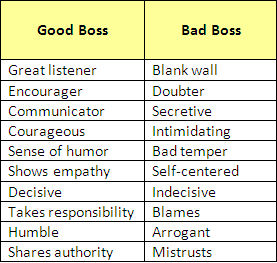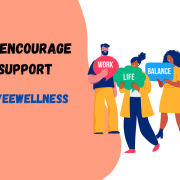Do You Work for a Good Boss or a Bad One?
Would you say you work for a good boss, or a bad one?Ask people about their bosses, and you’ll hear about the two types they’ve worked for: the ones they’ve loved and the ones they couldn’t wait to escape.
When asked for a list of defining qualities, most people identify the following attributes,
according to Social Intelligence author Daniel Goleman. The best bosses are those who are trustworthy, empathic and who connect with us. They make us feel calm, appreciated and inspired.
The worst bosses are distant, difficult and arrogant. They make us feel uneasy, at best, and resentful, at worst.
What sort of things give us these impressions? It often takes several faulty interactions with your boss to establish a perception. It may be glaringly obvious that a boss is arrogant; more often, however, impressions build up over time, based on unintended and misaligned interactions.
These are essentially communication styles. As bad habits, they are easy enough to break. The cure for failing to express gratitude is remembering to say “thank you.” For not apologizing, it’s learning to say, “I’m sorry. I’ll do better next time.” For punishing the messenger, it’s imagining how you would want to be treated under similar circumstances. For not listening, it’s keeping your mouth shut and your ears open.
Making such changes is not difficult. Most people lose sight of the many daily opportunities to correct these behaviors. In a previous post, I cited 10 bad leadership habits Marshall Goldsmith observed writing in his book What Got You Here Won’t Get You There. Here are 10 more communication habits business leaders fall into.
- Claiming credit we do not deserve. The most annoying way to overestimate our contribution to any success.
- Making excuses. The need to reposition our annoying behavior as a permanent fixture so people will excuse us for it.
- Clinging to the past. The need to deflect blame away from ourselves and onto events and people from our past; a subset of blaming everyone else.
- Playing favorites. Failing to see that we are treating someone unfairly.
- Refusing to express regret. The inability to take responsibility for our actions, admit we’re wrong or recognize how our actions affect others.
- Not listening. The most passive-aggressive form of disrespect for our colleagues.
- Failing to express gratitude. The most basic form of bad manners.
- Punishing the messenger. The misguided need to attack the innocent who, usually, are only trying to help us.
- Passing the buck. The need to blame everyone but ourselves.
- An excessive need to be “me.” Exalting our faults as virtues, simply because they embody who we are.
This is a scary group of bad behaviors, I think you can agree. Luckily, most people exhibit only one or two simultaneously.
Study these bad habits, and you’ll see that half are rooted in information compulsion. Most of us have an overwhelming need to tell others something they don’t know. When we add value, pass judgment, announce that we “already knew that” or explain “why that won’t work,” we are compulsively sharing information.
Likewise, when we fail to give recognition, claim credit we don’t deserve, refuse to apologize or neglect to express our gratitude, we are withholding information. Sharing and withholding information are two sides of the same coin.
In my experience, most managers have no idea the weight their employees give everything thing they say and every action they take, which makes it even more important to get this right. What do you think about this? Do any of these habits seem familiar to you? If so, perhaps we should talk?
(Photo credit: Freedigitalphotos.net)










